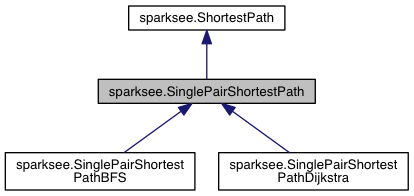SinglePairShortestPath class. More...


Public Member Functions | |
| def | run (self) |
| Runs the algorithm. More... | |
| def | exclude_nodes (self, nodes) |
| Set which nodes can't be used. More... | |
| def | add_all_edge_types (self, dir) |
| Allows for traversing all edge types of the graph. More... | |
| def | exclude_edges (self, edges) |
| Set which edges can't be used. More... | |
| def | add_edge_type (self, type, dir) |
| Allows for traversing edges of the given type. More... | |
| def | get_path_as_nodes (self) |
| Gets the shortest path between the source node and the destination node as an ordered set of nodes. More... | |
| def | get_path_as_edges (self) |
| Gets the shortest path between the source node and the destination node as an ordered set of edges. More... | |
| def | add_node_type (self, type) |
| Allows for traversing nodes of the given type. More... | |
| def | exists (self) |
| Returns TRUE If a path exists or FALSE otherwise. | |
| def | get_cost (self) |
| Gets the cost of the shortest path. More... | |
| def | set_maximum_hops (self, maxhops) |
| Sets the maximum hops restriction. More... | |
| def | add_all_node_types (self) |
| Allows for traversing all node types of the graph. | |
| def | close (self) |
| Closes the ShortestPath instance. More... | |
| def | is_closed (self) |
| Gets if ShortestPath has been closed or not. More... | |
Detailed Description
SinglePairShortestPath class.
Classes implementing this abstract class solve the shortest path problem in a graph from a given source node and to a given destination node.
Check out the 'Algorithms' section in the SPARKSEE User Manual for more details on this.
Member Function Documentation
| def sparksee.SinglePairShortestPath.add_all_edge_types | ( | self, | |
| dir | |||
| ) |
Allows for traversing all edge types of the graph.
- Parameters
-
dir [in] Edge direction.
| def sparksee.SinglePairShortestPath.add_edge_type | ( | self, | |
| type, | |||
| dir | |||
| ) |
Allows for traversing edges of the given type.
- Parameters
-
type [in] Edge type. dir [in] Edge direction.
| def sparksee.SinglePairShortestPath.add_node_type | ( | self, | |
| type | |||
| ) |
Allows for traversing nodes of the given type.
- Parameters
-
type null
|
inherited |
Closes the ShortestPath instance.
It must be called to ensure the integrity of all data.
| def sparksee.SinglePairShortestPath.exclude_edges | ( | self, | |
| edges | |||
| ) |
Set which edges can't be used.
This will replace any previously specified set of excluded edges. Should only be used to exclude the usage of specific edges from allowed edge types because it's less efficient than not allowing an edge type.
- Parameters
-
edges [in] A set of edge identifiers that must be kept intact until the destruction of the class.
| def sparksee.SinglePairShortestPath.exclude_nodes | ( | self, | |
| nodes | |||
| ) |
Set which nodes can't be used.
This will replace any previously specified set of excluded nodes. Should only be used to exclude the usage of specific nodes from allowed node types because it's less efficient than not allowing a node type.
- Parameters
-
nodes [in] A set of node identifiers that must be kept intact until the destruction of the class.
| def sparksee.SinglePairShortestPath.get_cost | ( | self | ) |
Gets the cost of the shortest path.
The cost for unweighted algorithms is the number of hops of the shortest path. For weighted algoritms, the cost is the sum of the costs of the edges of the shortest path.
- Returns
- The cost of the shortest path.
| def sparksee.SinglePairShortestPath.get_path_as_edges | ( | self | ) |
Gets the shortest path between the source node and the destination node as an ordered set of edges.
- Returns
- Ordered set of edge identifiers.
| def sparksee.SinglePairShortestPath.get_path_as_nodes | ( | self | ) |
Gets the shortest path between the source node and the destination node as an ordered set of nodes.
- Returns
- Ordered set of node identifiers.
|
inherited |
Gets if ShortestPath has been closed or not.
- See also
- close()
- Returns
- TRUE if the ShortestPath instance has been closed, FALSE otherwise.
| def sparksee.SinglePairShortestPath.run | ( | self | ) |
Runs the algorithm.
This method can only be called once.
| def sparksee.SinglePairShortestPath.set_maximum_hops | ( | self, | |
| maxhops | |||
| ) |
Sets the maximum hops restriction.
All paths longer than the maximum hops restriction will be ignored.
- Parameters
-
maxhops [in] The maximum hops restriction. It must be positive or zero. Zero, the default value, means unlimited.
 1.8.11
1.8.11